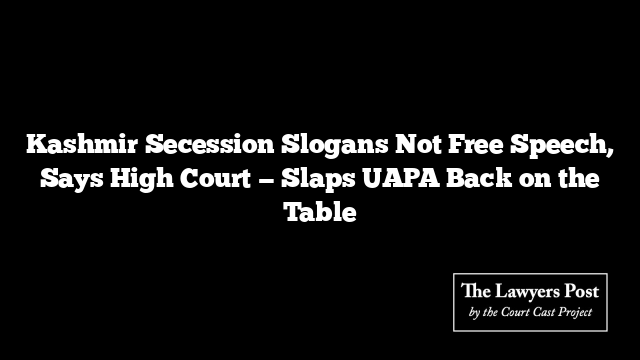In a sharp rebuke to a lower court’s leniency, the Jammu & Kashmir and Ladakh High Court has ruled that publicly inciting the secession of Kashmir from India isn’t protected expression — it’s a punishable offense under anti-terror law.
The case in question revolved around two men, Ameer Hamza Shah and Rayees Ahmed Mir, who had been discharged by a trial court after allegedly raising separatist slogans in Bandipora following Friday prayers back in March 2015. That court had held that sloganeering, without an eruption of violence, didn’t cross the line into “unlawful activity” under the Unlawful Activities (Prevention) Act (UAPA).
But the High Court wasn’t buying that argument. A Division Bench comprising Justices Sanjeev Kumar and Sanjay Parihar stepped in and dismantled the trial court’s rationale, declaring that the actions of the accused — calling for Kashmir’s separation from India — fall squarely within the UAPA’s definition of unlawful activity. Specifically, Section 13(1), which penalizes any conduct promoting secession from the Indian Union.
The lower court had leaned heavily on the Supreme Court’s judgment in Balwant Singh v. State of Punjab, a case that involved slogans raised post-Indira Gandhi’s assassination. But the High Court drew a hard line between that sedition-focused precedent and what it said was a UAPA-specific matter involving organized calls for territorial separation.
“There’s a legal world of difference between sedition under IPC and the concept of ‘unlawful activity’ under UAPA,” the judges emphasized, adding that witness statements recorded under Section 161 CrPC supported the prosecution’s claims.
With that, the High Court reactivated the chargesheet and instructed the trial court to move forward — this time with UAPA firmly in play.
The prosecution was represented by Government Advocate Faheem Shah and advocate Maha Majeed.





